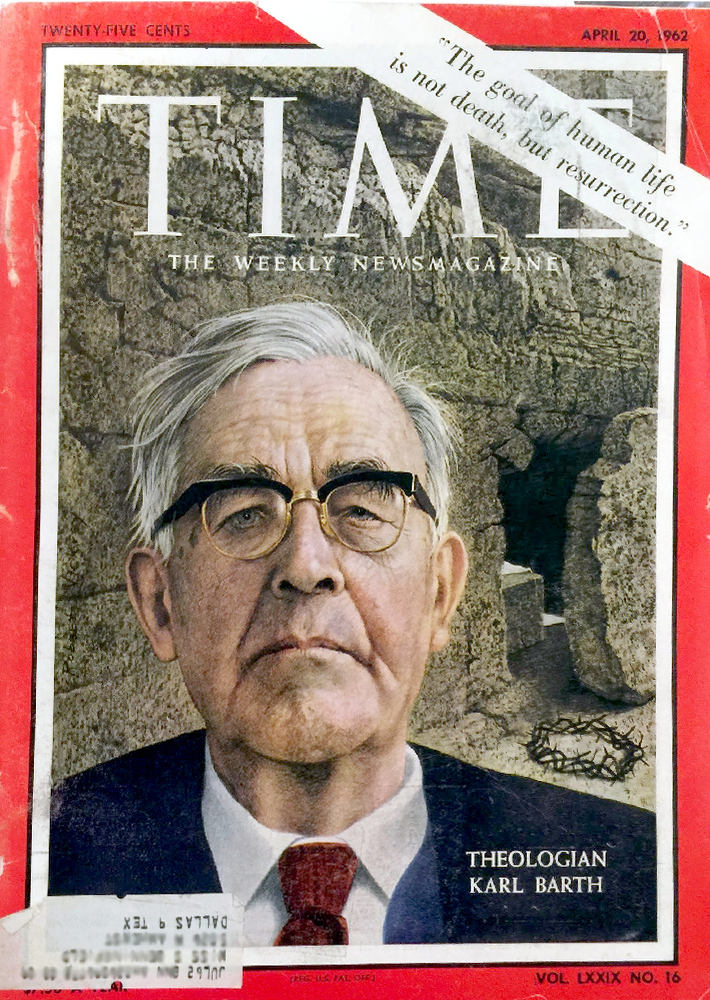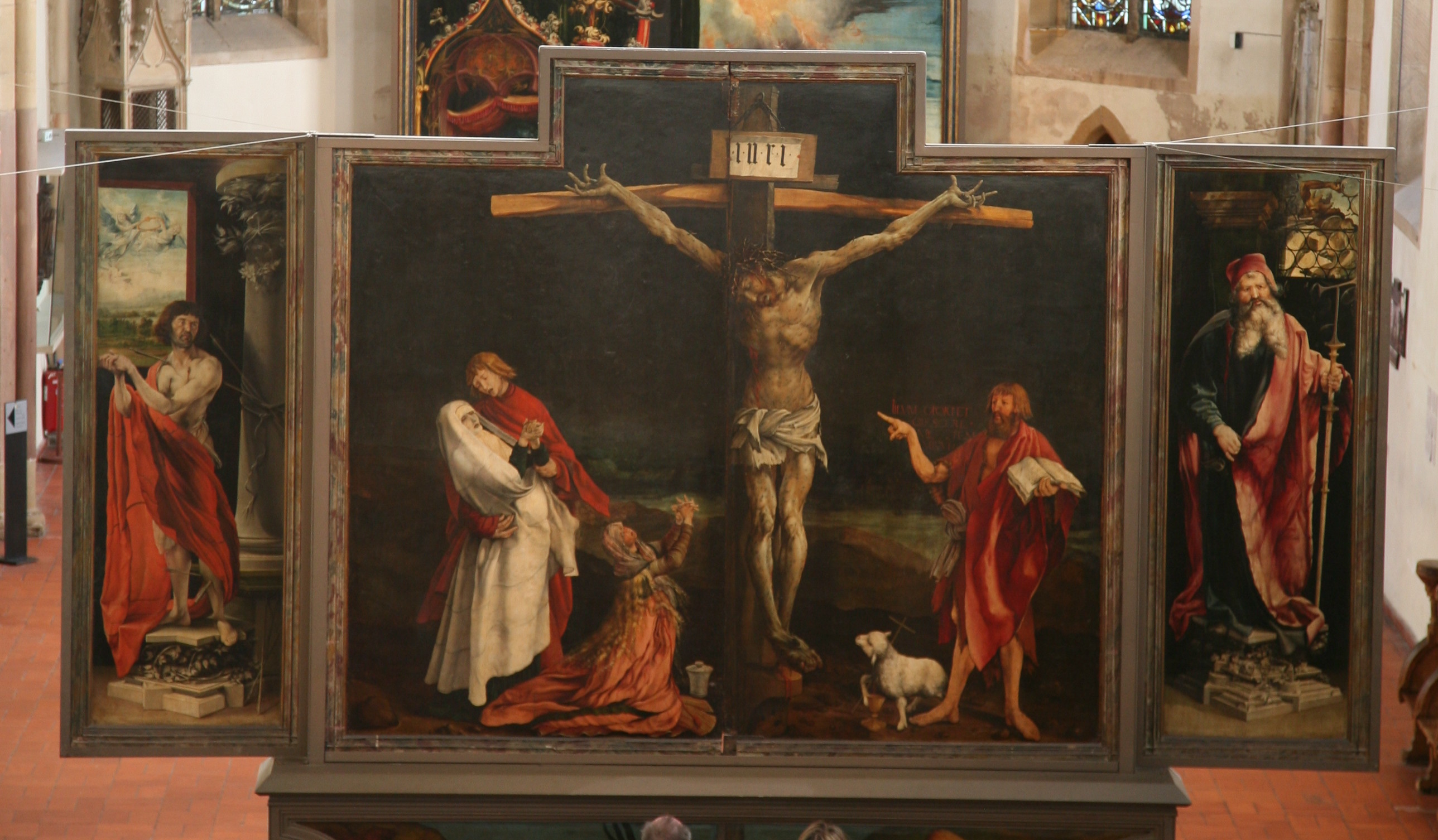(This is an expanded edition of an article that was originally published at biologos.org)
Evangelicals today are faced with many hard questions on the doctrine of creation, such as how the biblical creation stories are reconciled with evolutionary science, how to interpret the creation stories in the Bible, and whether there was a historical Adam. Reading Genesis leaves many evangelicals with more questions than answers. Like when the Ethiopian Eunuch was asked, "Do you understand what you are reading?" many evangelicals respond, "How can I, unless someone explains it to me?" (Acts 8:30-31) Why not ask the great Karl Barth to answer these hard questions?
Uncle Karl's evolution letter to his niece Christine
Once upon a time, Karl Barth's grandniece Christine wrote a letter to her 'Uncle Karl' after she was confronted by a Creationist teacher that told her that she must reject evolution. Uncle Karl responded that the biblical creation stories and evolution are like apples and oranges, such that "there can be as little question of harmony between them as of contradiction" and that her teacher should distinguish between them so not to be shut off from both science and the Bible. Barth explains that the biblical creation narratives are poetic witnesses revealing that God has created the heavens and the earth and that evolution is a natural science that uses the scientific hypothesis to explain how the world works by "human observation and research". Anytime a Creationist teacher says that evolution must be rejected to affirm the biblical creation stories, remember this letter and pronounce a loud NEIN! like Uncle Karl:
18 February 1965
Basel, Switzerland
Dear Christine,
. . . Has no one explained to you in your seminar that one can as little compare the biblical creation story with a scientific theory like that of evolution as one can compare, shall we say, an organ and a vacuum-cleaner—that there can be as little question of harmony between them as of contradiction?
The creation story is a witness to the beginning or becoming of all reality distinct from God in the light of God’s later acts and words relating to his people Israel — naturally in the form of a saga or poem. The theory of evolution is an attempt to explain the same reality in its inner nexus — naturally in the form of a scientific hypothesis.
The creation story deals only with the becoming of all things, and therefore with the revelation of God, which is inaccessible to science as such. The theory of evolution deals with that which has become, as it appears to human observation and research and as it invites human interpretation. Thus one’s attitude to the creation story and the theory of evolution can take the form of an either/or only if one shuts oneself off completely either from faith in God’s revelation or from the mind (or opportunity) for scientific understanding.
So tell that teacher concerned that she should distinguish what is to be distinguished and not shut herself off completely from either side. . . .
Yours,
Uncle Karl [2]
Who is the great Karl Barth?
Karl Barth (1886-1968) was a Swiss Reformed Protestant and arguably the greatest theologian of the last two centuries. He was a prolific author who is most well known for his commentary on The Epistle to the Romans, the thirteen volume systematic theology titled the Church Dogmatics (CD), the Barmen Declaration that was instrumental to the German Confessing Church during World War II. Pope Pius XII said Barth was “the greatest theologian since Thomas Aquinas.” The Scottish Protestant theologian, T.F. Torrance who knew Barth and was a translator of the Church Dogmatics described Barth as "the great Church Father of Evangelical Christendom, the one genuine Doctor of the universal Church the modern era has known. . . . Only Athanasius, Augustine, Aquinas and Calvin have performed comparable service." (CD IV/4, preface). John D. Godsey, professor emeritus of Wesley Theological Seminary, renowned Bonhoeffer scholar and protege of Barth said: "In him [Barth] a Church Father has walked among us." Love Barth or hate him, his contribution to theology today may not be understated.

Karl Barth on the cover of Time Magazine (July, 1962). From the personal collection of the author.[3]
Karl Barth's Doctrine of Creation
Karl Barth's Doctrine of Creation is a tome contained in the Church Dogmatics, Vol. III, weighing-in around 2,500 pages and printed in four parts. In a nutshell, Barth's "The Doctrine of Creation" (CD III/1-4) may be summarized as follows:
Church Dogmatics, III/1.) The first part, "The Work of Creation" contains Barth's commentary on the biblical creation stories (Genesis 1-3) formulated under Barth's famous twofold statement: "Creation is the external basis of the covenant. Covenant is the internal basis of the creation."
Church Dogmatics, III/2.) The second part, "The Creature" is one of the best volumes in the entire Church Dogmatics and contains many eye-popping discussions. Barth answers the question, "What is Man?" by pointing to Jesus Christ with the "prodigious index finger" of John the Baptist depicted in the Isenheim altarpiece.
Barth builds his anthropology on the person and work of Jesus Christ, identifying a true human being specifically revealed in Jesus alone who is the Real Man for God. Barth contrasts the Crucified One to Dionysius and explains how Jesus is a human being for others (unlike Nietzsche's Übermensch who is an isolated man for himself alone.)
Barth explains his general anthropology, not by studying the natural sciences, but by studying the phenomena of Man revealed by Jesus, the Man for God. Barth does not conclude that man in general is two parts (dichotomy) or three parts (trichotomy) but rather Barth affirms a dialectic between soul and body: a human being is defined as "the soul of my body and the body of my soul". (A footnote in this section contains the only reference to Charles Darwin and Darwinism in the entire Church Dogmatics, and in it, Barth does not oppose Darwinism, but opposes any Darwinist that denies that true humanity is uniquely revealed in Jesus.) This volume concludes with a [in]famous eschatological section on time vs. eternity that assess Jesus as the lord of time and then compares given time vs. allotted time vs. beginning time vs. ending time.
Barth never finished the Church Dogmatics, and the fifth and final volume was planned with the title the "Doctrine of Redemption" (CD V) and was to be on the topic of Eschatology (Last Things), but Barth abandoned the Church Dogmatics before writing CD V, leaving a great mystery in what Barth might have said in CD V. So, CD III/2, §47 contains Barth's shocking eschatology and a hint at what he might have written in the final volume (but who knows?)
Church Dogmatics, III/3.) The third part, "The Creator and His Creature" contains Barth's Doctrine of Providence (which is an extension of his famous Doctrine of Election in CD II/2. It ends with Barth's Doctrine of Angels (and Demons!)
Church Dogmatics, III/4.) The final part, "The Command of God the Creator" is an ethic of creation. It explains how the theology of Barth's Doctrine of Creation may be applied to life here and now and discusses many ethical loci including Barth's perspective on Marriage, Parenting, Self-Defense, Capital Punishment, Suicide, Vocation, and many other topics.
Karl Barth on interpreting the creation stories in Genesis
Now that we have Barth's Doctrine of Creation described in a nutshell, how are the biblical creation stories in the beginning of Genesis to be interpreted? According to Barth, they are neither mythology nor scientific literature; they are aetiological 'saga' that he defines as "a pre-historical reality of history." This means that the biblical creation stories are based on real events in history, such that something really happened, so that these stories may not be degenerated into legend or conceived inadequately as myth; however, the proto-history in Genesis 1-11 is dissimilar to modern history, and does not communicate verifiable brute facts that may be to used to establish the age of the Earth or its geological past, or refute established scientific theories such as the evolution of humans or other animals.
Barth's definition of saga:
"I am using saga in the sense of an intuitive and poetic picture of a pre-historical reality of history which is enacted once and for all within the confines of time and space. Legend and anecdote are to be regarded as a degenerate form of saga: legend as the depiction in saga form of a concrete individual personality; and anecdote as the sudden illumination in saga form either of a personality of this kind or of a concretely historical situation. If the concept of myth proves inadequate—as is still to be shown—it is obvious that the only concept to describe the biblical history of creation is that of saga." [5]
—Karl Barth
The Babylonian creation stories such as the Enûma Eliš are also saga, according to Barth, and share a 'critical connection' with Genesis such that Genesis had a kind of dependence on them, even if its uncertain whether this was a direct or indirect relationship. The Babylonian creation stories pre-date Genesis, but Genesis shares the same ancient Near East (ANE) cosmology as these creation stories. This means that Genesis was born from the ANE, and that it accommodates its creation stories to the received cosmology of the ANE. However, we no longer share the cosmology of the ANE, so in order to understand Genesis we must translate or 'demythologize' it, and this means we may not use Genesis to scientifically critique modern cosmology or natural sciences. (Karl Barth's perspective of Genesis has remarkable similarities to recent non-concordist interpreters of Genesis, such as John H. Walton, the author of The Lost World of Genesis One.)
"What we read in Gen 1 and 2 are genuine histories of creation. If there is a connexion with the Babylonian myth or its older sources, it is a critical connexion. Everything is so different that the only choice is either to see in the Jewish rendering a complete caricature of the Babylonian, or in the Babylonian a complete caricature of the Jewish, according to the standpoint adopted."[6]
—Karl Barth
Barth says that the Word of God shares the same genre of saga as the Babylonian epics but these epics do not reveal the Word of God like the Bible. The Word of God is not revealed in the Illiad or any other great work of literature from the ANE or of modern times. Barth rejects all forms of the analogia entis, which sounds like the cousin of the praying mantis or an ominous alien insect from outer-space, but really means that God has chosen to reveal himself through the person and work of Jesus alone as witnessed by the bible and preached by the church. Barth famously expresses this in the following comment from the preface to the first volume of the Church Dogmatics: "Hence I have had no option but to say No at this point. I regard the analogia entis as the invention of Antichrist" [7]
Barth on the Historical Adam: We are all Adam
One of the most controversial questions among Evangelicals, as it relates to science and the Bible, is whether there was a historical Adam. Barth's view of the historical Adam may be summarized by the following ten points:
#1. There are two biblical passages that explicitly refer to Adam: Genesis 2-3 and Romans 5:12-21 (1 Corinthians 15:22,24 may also be considered.)
#2. These passages contain elements of the Saga literary genre that makes scientific paleontology impossible to derive from them, or for polygenism to be excluded, or for specific information about a historical-Adam to be derived from these biblical texts.
#3. Adam has a twofold interpretation: an individual man and a general title for all individuals, such one meaning always includes the other.
#4. Adam is more than a metonymy that refers to humanity in general, he is a first among equals, meaning that he is the first man to rebel in a rebellion that all people have joined.
#5. The fallen state of Adam (man) is not a poison that was passed on to Adam's children or a sexually transmitted disease, but a rebellion that Adam initiated, that all who were around and part of Adam, regardless of physical descent had joined in upon.
#6. This fallen state is the consequence of no single historical act: it is the unavoidable presupposition of all human history. Adam’s rebellion is one act, but all people participate in that act. The ‘Fall’ is the condemnation unto death, pronounced upon all men by God for this act in all human history, such that “by one man's disobedience the many were made sinners” (cf. Romans 5:18-19)
#7. There never was a golden age. There is no point in looking back to one. The first man was immediately the first sinner.
#8. Adam is like the rainbow in relation to Jesus like the sun. Adam is only a reflection of Jesus. The rainbow has no existence independent of the Sun. The rainbow cannot stand against the sun. It does not balance it, and the same is of all people in Adam and the one person of Jesus.
#9. Barth and Calvin teach that the corruption of all mankind in the person of Adam alone did not proceed from ordinary generation (i.e. physical descent from Adam), but from the appointment of God.
#10. No one has to be Adam. We are so freely and on our own responsibility. Although the guilt of Adam is like ours, it is just as little our excuse as our guilt is his.
Here is Karl Barth in his own words on the Historical Adam:
"The Bible gives to this history and to all men in this sense the general title of Adam. Adam is mentioned relatively seldom both in the Old Testament and the New. There are only two passages which treat of him explicitly: Gen 2-3 and Rom 5:12-21 (to which we might add 1 Cor 15:22,45). The meaning of Adam is simply man, and as the bearer of this name which denotes the being and essence of all other men, Adam appears in the Genesis story as the man who owes his existence directly to the creative will and Word and act of God without any human intervention, the man who is to that extent the first man. . . . It is the name of Adam the transgressor which God gives to world-history as a whole. The name of Adam sums up this history as the history of the mankind which God has given up, given up to its pride on account of its pride. . . . It is continually like it. With innumerable variations it constantly repeats it. It constantly re-enacts the little scene in the garden of Eden. There never was a golden age. There is no point in looking back to one. The first man was immediately the first sinner." [8]
—Karl Barth
Conclusion
Karl Barth firmly believed in the threefold witness of the Word of God revealed in the person and work of Jesus Christ as witnessed by the Holy Scriptures and in the preaching of the church. Barth also firmly believes that the scientific consensus on Evolution is within the parameters and limits of the Word of God. The Bible is not a scientific textbook, but does contain the unique revelation of God that is not revealed in any other book or source. So scientists are free to use the scientific method and follow its conclusions and at the same time fully believe with out compromise in Jesus Christ and Christianity. So now is as good of time as ever, to listen to the advice of our 'Uncle Karl' on how to answer these hard questions on the science and the Bible.
References:
- Header image: used with permission from the Karl Barth Archiv, https://karlbarth.unibas.ch
- Geoffrey Bromily (trans.), Karl Barth Letters: 1961-1968, #181 (p. 184)
- 1962 Time Magazine Cover, personal collection
- By vincent desjardins - Alsace, Haut-Rhin, Colmar, Musée d'UnterLinden : Mathias Grünewald, " retable d'Issenheim : la Crucifixion " entre 1512 et 1516., CC BY 2.0, https://commons.wikimedia.org/w/index.php?curid=11167283
- Barth, Karl. "Church Dogmatics Study Edition 21" Ed. T. F. Torrance and G.W. Bromiley. III.1 The Doctrine of Creation. Trans. G. W. Bromiley. London: T & T Clark, 2010. 81. Print
- Karl Barth, Church Dogmatics, Vol. 3.1, Sections 40-42: The Doctrine of Creation, Study Edition 13. London: T & T Clark, 2010. [89]. Print.
- Karl Barth, Church Dogmatics Vol I.1; http://media.bloomsbury.com/rep/files/i-1-usa.pdf
- Barth, Karl. Trans. G. W. Bromiley. Church Dogmatics: IV.1 The Doctrine of Reconciliation. Ed. G. W. Bromiley and T. F. Torrance. Vol. 22. London: T & T Clark, 2009. [507-08]. Print. Study Edition.





Leave a comment